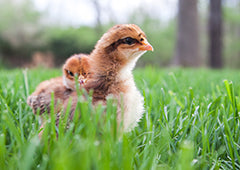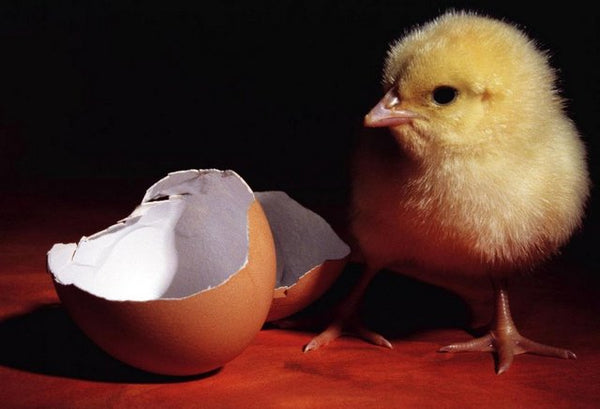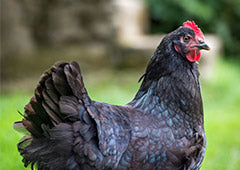What are they?
Technically speaking, fertile eggs are where the ‘blastodisc’ turns into a ‘blastoderm’ - the first stage of a developing embryo. In layman's terms, it means the egg has been fertilized by a rooster and can develop into a baby chicken.
How much do they cost?
The cost generally depends on the breed of chicken you’re buying, and where. It can vary from $12-$25 eggs for a dozen.
Where do I find them?
There are many ways you can get your hands on some fertilized eggs:
-
Introduce a rooster to your flock
If you have a hen and a rooster, then you have the tools to produce fertile eggs! You can introduce a rooster to your flock for a period of time, or go ahead and purchase one if you want a continuous supply.
-
Hobby Farms and Sellers Most hobby farms that sell chickens will have a variety of fertile eggs which you can go and pick up yourself. If you are going to be transporting them in the car, try storing them in an egg carton, and make sure they’re cushioned as car rides can be rough on the cargo. Also, if you have transported them a long distance then make sure you give them a day to rest
-
Online There are a wide range of different websites that can post fertile eggs from a wide range of breeds to your doorstep if you don’t feel like going out the door. Make sure you go with a reputable place that actually takes care of their precious cargo, otherwise you might find yourself opening the door to a parcel of smashed eggs. Also be aware that whilst your package may say ‘fragile’, it may not be treated as such. It’s a bit of a gamble, so it’s up to you. There are a number of places in Australia that will post them, a simple Google search for local businesses will be the best option.
How do chicken eggs get fertilized?
In short, a fertile, lonely rooster will search for a mate, mount a hen and touch his cloaca with hers. This romantic moment is known as a cloacaic kiss!
Sadly, he won't offer to take her to dinner but there are some mating etiquettes in the chicken world too. Once the rooster has decided which hen he would like to mate with, he dances for her by dragging and dropping a wing and stamping his feet. He'll circle her as he dances and puts on a proper good show! Alongside this clear grab for attention, he will attempt to get behind the hen. If she enjoyed his dance and felt that deep loving connection, she will squat down so that he can mount her. Even if she doesn't seem into it, the rooster will try to have his way with her anyway!
The rooster's seed is usually stored in the hen's storage sac until the next egg is laid and the production of a new one begins. This allows for the developing egg to be inseminated.
Interesting chicken egg fertilization fact: There is research suggesting that hens can unconsciously decide whether or not to use the seed from a mate. She may be able to get rid of it if it's not to her fancy!
How do I know whether they will hatch?
To check how your fertile eggs are doing or whether there has been any damage, you should candle the eggs. This is done by holding a light source to the bottom of the egg, which illuminates its contents.
Things to look for:
- hairline cracks: if you see any fine cracks in the shell, probably best to just dispose of them as their chances of hatching are low
- air sacks: there is a visible air sac in the fertile egg, and sometimes transportation causes the air sac to break apart and ‘float’ around inside it. Generally this means that you should discard them as they will not hatch.
Fertile eggs are readily available from a number of sources, and you can buy eggs from a wide variety of breeds.
If you do choose to incubate your fertile eggs, you're about to embark on an amazing journey! Be sure to read our other comprehensive incubating articles to ensure you are well prepared for the rewarding process.
Whether you choose to incubate or let your ladies lay, there is so much to learn about bringing new life into the world. With the right knowledge and advice, it can be a joyful and eggstraordinary experience for the whole family. Nothing compares to seeing fluffy little hatchlings peck out of their shells. Getting to this perfect moment does come with a fair few challenges and risks which can be stressful and overwhelming, especially without the right information.
This is why I recommend our friends at Chickenpedia to all of my readers. They have created the brilliant Hatch A Plan course to help you successfully incubate and hatch happy and healthy chicks. Their course offers the best advice to ensure you build your knowledge to avoid fatal disasters, as these little ones can be so sensitive to temperature! You can learn about the conditions and equipment needed to confidently bring new life into the world.
As chicken keepers, we want to do an eggcellent job when caring for our feathered friends. Many chicken keepers struggle to handle chicken health or behaviour issues, especially in the first few years of having a flock. Chickenpedia have comprehensive online courses on everything you didn’t know you need to know and then some more! From raising baby chicks to feeding and behavior, you’ll find beginner-friendly courses that’ll give you the knowledge and confidence to successfully look after your chickens for years to come.
These courses are exclusive to members only, so flock to Chickenpedia today!



















